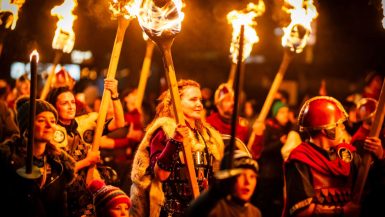
On the eastern edge of Fife, where the River Leven meets the Firth of Forth, lies the town of Leven—a place shaped by centuries of trade, industry, and quiet resilience. With its golden beaches, historic churches, and ties to ancient clans, Leven is more than a seaside town. Beneath its tranquil surface lies a deeper, sometimes darker story—one that includes echoes of Scotland’s witch trials and the communities that bore witness to them.
🌊 Leven: A Town Forged by Water and Industry
Leven’s name comes from the Pictish word for “flood,” a nod to nearby Loch Leven and the river that flows from it. The town grew around this waterway, becoming a hub for fishing, milling, and later, textile production. By the 19th century, Leven was a thriving resort town, drawing visitors from Glasgow and beyond thanks to its railway connection and scenic coastline.
The River Leven powered mills and distilleries, and the town’s harbor welcomed ships from Scandinavia and the Baltics. Though much of its heavy industry has faded, Leven’s legacy lives on in its architecture, waterways, and community pride.
🛡️ Clan Connections: MacDuff and the Noble Lineage of Fife
While Leven itself wasn’t a stronghold for clan warfare, the surrounding region of Fife was historically dominated by Clan MacDuff, one of the most ancient and noble families in Scotland. The MacDuffs were the Earls of Fife and held the hereditary right to crown Scottish kings. Their influence stretched across the region, including nearby Loch Leven Castle, where Mary, Queen of Scots was imprisoned in 1567.
Other clans with ties to Fife include:
- Clan Wemyss, whose name means “cave” in Gaelic, referencing the coastal caves near East Wemyss.
- Clan Lindsay, who held lands throughout Fife and played key roles in medieval Scottish politics.
These clans shaped the cultural and political landscape of the region, leaving behind castles, churches, and stories that still echo through the glens and coastlines.
🔥 Witchcraft in Fife: Trials, Accusations, and Fear
Fife was one of the most active regions during Scotland’s witch-hunting era, particularly in the 16th and 17th centuries. While Leven itself doesn’t appear prominently in surviving trial records, nearby communities—including Pittenweem, Burntisland, and Kirkcaldy—were deeply affected.
- Pittenweem, just a short drive from Leven, was the site of notorious witch trials in the early 1700s. One of the most infamous cases involved Janet Cornfoot, who was accused of witchcraft and brutally killed by a mob after being imprisoned and tortured.
- Burntisland saw multiple trials and executions, with women accused of causing illness, crop failure, or consorting with the devil.
- Kirkcaldy, further south, was home to several documented trials, and local folklore still speaks of haunted sites and lingering spirits.
These events were part of a broader wave of fear and superstition that swept across Scotland, fueled by religious reform, political instability, and patriarchal control. Thousands of people—mostly women—were accused, tortured, and executed during this period.
While Leven may not have been a central site of witch trials, the cultural memory of these events permeates the region. The coastal caves, ancient kirks, and quiet graveyards hold stories that speak to a time when fear ruled and justice faltered.
🏘️ Levenmouth and the Modern Community
Leven is part of the Levenmouth area, which includes:
- Methil, once a coal port and now a center for renewable energy innovation.
- Buckhaven, a former fishing village with strong community roots.
- Lundin Links, known for its historic golf course and scenic views.
- Glenrothes, a planned town with public art and modern infrastructure.
Together, these communities form a vibrant region that honors its past while embracing the future. The reopening of Leven’s railway station in 2024 has reconnected the town to the national network, sparking renewed interest in tourism, heritage, and economic growth.
Final Thoughts
Leven is a town of layers—coastal charm, industrial grit, and historical depth. From the noble lineage of Clan MacDuff to the haunting legacy of Fife’s witch trials, it offers a window into Scotland’s complex and compelling past. Whether you’re walking its beaches, exploring nearby castles, or tracing the footsteps of those who lived—and died—under suspicion, Leven invites you to listen closely. The stories are there, carried on the wind and whispered through the waves.
Sources:
- Fife Council Archives
- The Survey of Scottish Witchcraft (University of Edinburgh)
- Historic Environment Scotland: Loch Leven Castle
- VisitScotland: Levenmouth and Fife Coast




Leave a reply
You must be logged in to post a comment.